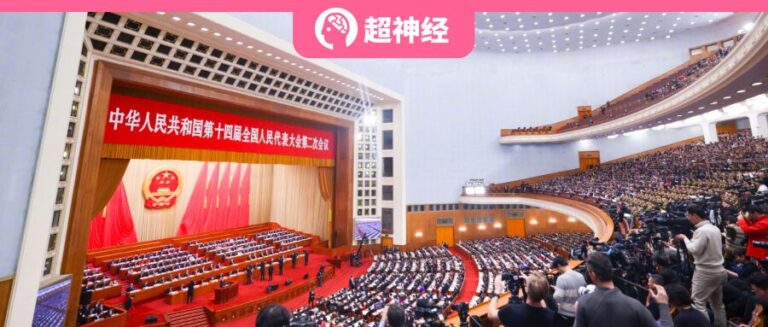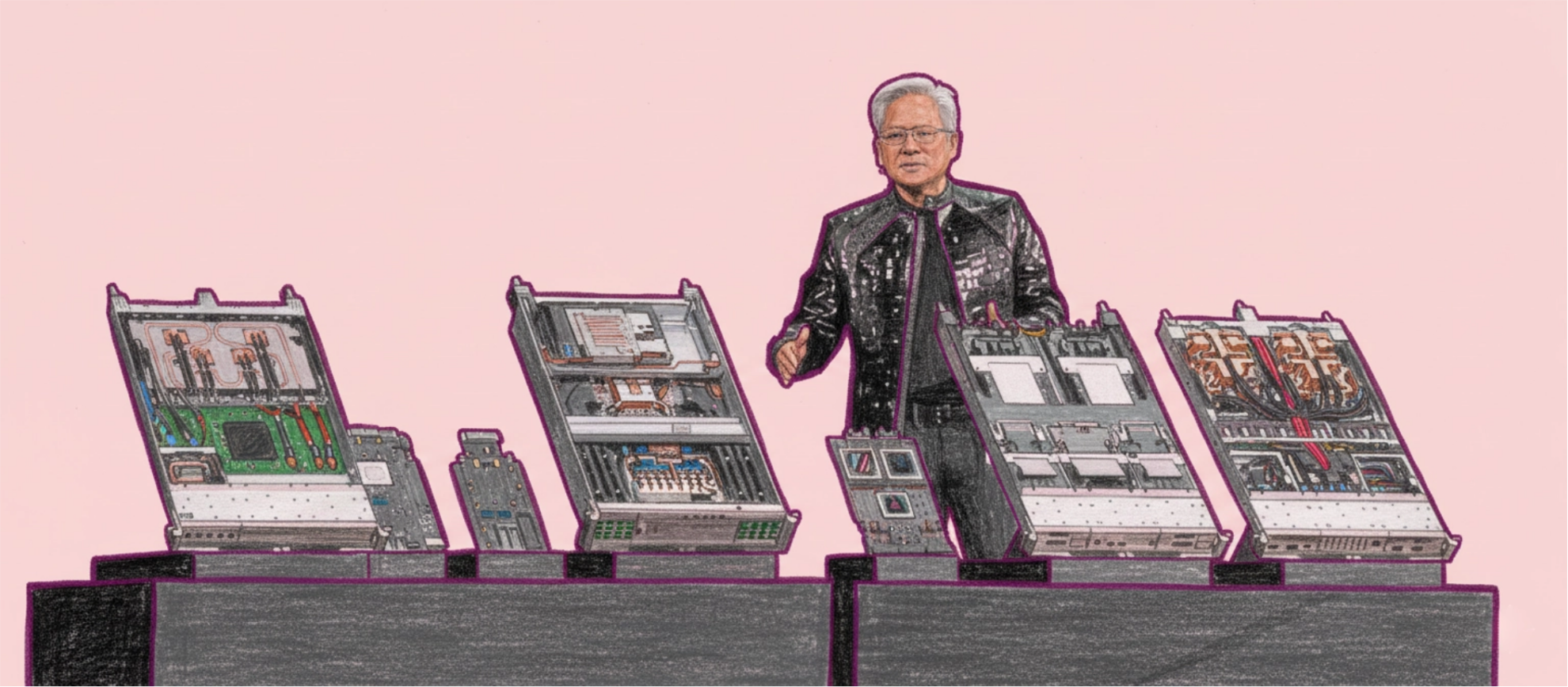Command Palette
Search for a command to run...
During the Two Sessions, Technology Leaders Mentioned AI4S/talent training/computing power/large models/industry General Data sets...

Recently, the second session of the 14th National People's Congress and the second session of the 14th National Committee of the Chinese People's Political Consultative Conference opened in Beijing. The annual "two sessions" also officially kicked off. As major events related to national affairs, from national development plans to people's livelihood, they are all hot topics discussed by the general public.

Among them, scientific and technological innovation is not only one of the pillars of politics and diplomacy, but also an important driving force for improving people's livelihood. Therefore, emerging technologies such as artificial intelligence and 5G are not only topics that must be discussed in the government work report, but also key topics in the proposals and suggestions of NPC deputies and CPPCC members from all walks of life.
In his review of the work in 2023 in the Government Work Report on March 5, the Premier mentioned that my country has achieved new breakthroughs in scientific and technological innovation. The construction of the national laboratory system has been vigorously promoted. Fruitful results have been achieved in the research and development of key core technologies, and great progress has been made in the development of high-end equipment such as aircraft engines, gas turbines, and fourth-generation nuclear power units. Innovative results in cutting-edge fields such as artificial intelligence and quantum technology continue to emerge. The turnover of technical contracts increased by 28.6%. The ability to drive development through innovation continues to improve.
The government's work tasks for 2024 also clearly state that it is necessary to actively cultivate emerging industries and future industries. It is mentioned that it is necessary to consolidate and expand the leading advantages of industries such as intelligent networked new energy vehicles.Accelerate the development of cutting-edge emerging industries such as hydrogen energy, new materials, and innovative drugs, and actively create new growth engines such as biomanufacturing, commercial aerospace, and low-altitude economy.Formulate future industrial development plans, open up new tracks such as quantum technology and life sciences, and create a number of future industry pilot zones.
In addition, the Prime Minister also mentioned the need to further promote the innovative development of the digital economy. It clearly pointed out that we should deepen the research and development and application of big data, artificial intelligence, etc., carry out the "artificial intelligence +" action, and build a digital industry cluster with international competitiveness. At the same time, we should also build digital infrastructure in a moderately advanced manner and accelerate the formation of a national integrated computing system.
There is no doubt that the Government Work Report affirmed the progress of my country's scientific and technological innovation in 2023 on the one hand, and provided guidance for the development of the science and technology industry in the new year on the other. At the same time, as entrepreneurs who are engaged in the development of science and technology, the bigwigs in the science and technology circle also have some understanding and insights on the foothold and path of scientific and technological innovation and development. Therefore, we can see that during the two sessions, many CPPCC members and NPC deputies from the science and technology circle have offered suggestions on AI, big data, data security and other aspects.
Liu Qingfeng: Promoting the in-depth integration of large models and scientific research
Liu Qingfeng, deputy to the National People's Congress and chairman of iFLYTEK, suggested that based on the 2017 "New Generation Artificial Intelligence Development Plan", a national "General Artificial Intelligence Development Plan" should be systematically formulated to continuously narrow the gap between the general artificial intelligence industries of China and the United States in terms of general base platforms, and to build my country's comparative advantages in industry applications and value creation. In addition, Liu Qingfeng also made 9 suggestions on accelerating the promotion of general artificial intelligence:
* It is recommended to give full play to the advantages of the national system, increase and maintain continuous investment in the "main battlefield" of general large-scale model bases.
* It is recommended to accelerate the formation of an independent and controllable industrial ecosystem around domestic large models.
* It is recommended to promote the opening and sharing of high-quality national training data.
* It is recommended to introduce more objective, fair and reliable evaluation methods to accelerate the application of big models in the industry.
* It is recommended to insist on systematic innovation of original core technologies and make good arrangements in strategic and forward-looking basic research fields.
*It is recommended to accelerate the promotion of big models to empower all stages of education, and use a new mechanism to speed up the exploration of cultivating top innovative talents in artificial intelligence in my country.
* It is recommended to study the talent ability and quality model and training program in the era of general artificial intelligence to accelerate the training of application-oriented talents.
* It is recommended to accelerate the formulation and review of laws and regulations related to general artificial intelligence technology.
* It is recommended to set up soft topics to conduct ethical and humanistic research related to general artificial intelligence.
Among them, in terms of the layout of strategic and forward-looking basic research fields, Liu Qingfeng proposed to promote the in-depth integration of large models and scientific research.Creating a new paradigm for AI for Science,Research AI modeling and scientific knowledge extraction technology based on scientific data,Help researchers conduct scientific research and exploration more efficiently.Introducing general courses on artificial intelligence in many scientific research fields such as life sciences, chemistry, pharmaceuticals, physics, and materials.Cultivate a group of talents with professional scientific research capabilities and high-level understanding of general artificial intelligence, and prepare for major breakthroughs that may emerge in interdisciplinary disciplines.
Lei Jun: Incorporate AI into compulsory education
Lei Jun, deputy to the National People's Congress and founder of Xiaomi Group, submitted four suggestions to the conference on low carbon and intelligence:
* Accelerate the construction of green and low-carbon supply chain in manufacturing.
* Strengthen the training of artificial intelligence talents to meet the needs of technological change.
* Further standardize the safe application of intelligent driving products.
* Increase support for intelligent manufacturing and accelerate the development of integrated advanced technologies.
Among them, Lei Jun's suggestions on education sparked widespread discussion. He said that from a long-term perspective, the demand for manpower with basic AI skills in all walks of life is growing rapidly. Judging from my country's actual technical level of generative AI, there are still obvious deficiencies, especially in the reserve of top AI talents, and there is an even greater shortage of compound AI talents.
so,He suggested popularizing AI quality education from the compulsory education stage, vigorously promoting the construction of AI-related majors in colleges and universities, and supporting large technology companies and education and training institutions in cultivating AI application talents.
Zhou Hongyi: Focus on AI and security
This year marks the seventh year that Zhou Hongyi, a member of the National Committee of the Chinese People's Political Consultative Conference and founder of 360 Group, has been in office. He has prepared three proposals, focusing on AI and security.
In the "Proposal on Deepening the Development of Multi-Scenario Application of Artificial Intelligence to Support Large Models in the Direction of Verticalization and Industrialization",Zhou Hongyi said that enterprises should not rush into using big models, but should use AI to gradually transform their businesses, step by step, and accumulate small victories into big ones. In practice, it is necessary to split the scenarios for specific analysis, find the right entry point in the business process, and choose the business links that match the mature capabilities of the big model. Although the entry point is small, it can be advanced in depth, have a great impact on the business, and achieve greater transformation results.
In the proposal on encouraging enterprises with both "security and AI" capabilities to solve the security issues of general large models,Zhou Hongyi suggested that the country pay more attention to the security issues of general large models, give special support policies to enterprises with both "security and AI" capabilities, and better play their important role in solving the security issues of general large models. He said that general large models have a profound impact on all aspects of the economy and society, and security issues are of vital importance, but the current security issues of large models in China are not optimistic. On the one hand, domestic large model companies are not familiar with the security challenges brought by artificial intelligence such as content security, data security, scientific and technological ethics, and network security; on the other hand, most security companies rarely have the ability to conduct in-depth research on large models.
In the "Proposal on Comprehensively Building a Secure Cloud and Promoting Digital Security Cloud Services",Zhou Hongyi made three suggestions. First, we should coordinate the construction of digital security public service infrastructure and concentrate digital security capabilities. Second, we should change the idea of focusing on construction and neglecting results, and encourage all units to purchase digital security cloud services as an upgrade path for traditional network security construction. Third, we should encourage network security companies to actively transform and contribute to the improvement of the country's overall digital security level in the form of security as a service, especially encouraging leading companies with core technologies to play a greater role.
Yang Jie: Comprehensively promote the "AI+" action
Yang Jie, member of the Standing Committee of the National Committee of the Chinese People's Political Consultative Conference and Chairman of China Mobile, proposed a proposal during this year's two sessions to "fully promote the "AI+" action and accelerate the formation of new quality productivity", which coincides with the "launch of artificial intelligence + action" mentioned in the government work report.
Yang Jie proposed thatThe first is to coordinate the coordinated development of computational intelligence, perceptual intelligence, cognitive intelligence, and motion intelligence to lay a solid foundation for the development of "AI+".
He suggested strengthening the organic integration and systematic innovation of the "four types of intelligence", accelerating major breakthroughs in forward-looking basic research and leading original achievements, promoting AI to have stronger cognitive, judgmental and creative abilities, and injecting strong momentum into the formation of new quality productivity.
The second is to accelerate the promotion of artificial intelligence to benefit thousands of households, empower thousands of industries, and build an "AI+" industrial highland.Yang Jie believes that artificial intelligence should not only be able to "write poetry" but also to "do things", so as to drive deep-seated changes in productivity through the high-quality development of the industry.
He proposed that we should promote the all-round and in-depth integration of AI into key areas and core links of the real economy, focus on the people's needs for a better life in education, medical care, elderly care, entertainment and other fields, and accelerate the layout of strategic emerging industries and new tracks of future industries such as super-large intelligent computing centers, humanoid robots, unmanned driving, and future biology.
The third is to explore the construction of an innovation consortium with enterprises as the main body and deep integration of production, education, research and application, to lay a fertile ground for "AI+" innovation.
Yang Jie believes thatThe development of AI is a systematic innovation of "big science + big engineering", involving cross-disciplinary integration.As well as the integration of basic research, technology development, product cultivation and other links. It is necessary to integrate advantageous resources such as production, education, and scientific research, coordinate key innovation links in the upper, middle and lower reaches, and improve the scientific and technological innovation evaluation system and incentive mechanism, which will help create a good atmosphere that encourages innovation, dares to break through, and tolerates trial and error, and widely attract global AI leaders and well-known scholars, thereby cultivating a group of demonstration benchmark applications for key industries in the national economy, promoting the deep integration of the innovation chain, industrial chain, capital chain, and talent chain, and accelerating AI technology breakthroughs and application popularization.
Zhang Zhiyong: Improving computing power resource supply capabilities
Zhang Zhiyong, deputy to the National People's Congress and chairman of China Tower, has prepared four suggestions for the two sessions in 2024, focusing on the high-quality development of large-scale models in the industry, coordinated deployment and application of edge computing power, improvement of emergency support systems, and full life cycle monitoring and traceability of new energy lithium batteries.
Among them, in terms of the development of large models, Zhang Zhiyong pointed out that at this stage, problems such as insufficient computing resources, low data quality, insufficient open scenarios, high application deployment costs, and model data security risks have formed certain constraints on the development of large models in the industry.
In this regard,He suggested improving the supply capacity of computing resources.Establish a public computing resource dispatching platform to promote collaborative sharing of computing resources and improve the efficiency of computing resource utilization. At the same time, enhance independent innovation capabilities and increase support for domestic hardware in terms of policy guidance, brand promotion, and industry procurement.Promote the localization of AI deep learning framework and AI hardware computing 100%.Accelerate the construction of single-body ultra-large-scale industry intelligent computing centers that can provide integrated training and reasoning.
At the same time, Zhang Zhiyong also suggested improving the level of industry data supply, accelerating the construction of innovative application scenarios, reducing application deployment costs, strengthening model data security, and strengthening industrial policy support and talent training.
Liao Zengtai: Forming a national-level general data set for the chemical industry
Liao Zengtai, deputy to the National People's Congress and chairman of Wanhua Chemical, brought forward "Suggestions on the Deep Integration of Artificial Intelligence and the Chemical Industry" at this year's National People's Congress. He suggested that multiple parties should work together toForm a national-level general data set for the chemical industry and provide policy support to encourage the trial implementation of artificial intelligence in typical application scenarios in the chemical industry.At the same time, a complete artificial intelligence talent training strategy and introduction policy should be established to strengthen the construction of the AI talent system.
In terms of industry-wide data sets, Liao Zengtai said that the chemical industry has complex product categories, involving all aspects of production and life, and the deep integration of artificial intelligence and the chemical industry is highly dependent on the construction of industry data sets. At present, various basic data (such as physical property libraries) are insufficient, the amount of professional literature and experimental process data is huge, the workload of data collection, collation and annotation is huge, and industry data standards are lacking. At the same time, it also involves issues such as commercial confidentiality and data security, making it difficult to form an industry-wide data set.
So, he suggested,The government will take the lead in organizing relevant departments, universities, chemical industry associations, and data standard organizations to establish chemical industry data standards that meet international standards and organize the collection of common basic data for the chemical industry.Professional data annotation is also carried out to form a national-level general data set for the chemical industry, providing a data foundation for the industry's basic large-scale model training and intelligent construction.
Final Thoughts
In the digital economy era, technological innovation is an important engine driving the development of the industry, and behind innovation and breakthroughs, talent is undoubtedly the top priority. In fact, in addition to Lei Jun, many NPC deputies and CPPCC members have brought suggestions and proposals on talent training, not only suggesting that related disciplines of cutting-edge technologies such as artificial intelligence and integrated circuits be introduced into teaching earlier, but also hoping to give young researchers and related practitioners more room for development.
In this regard,Yin Hejun, Secretary of the Party Committee and Minister of the Ministry of Science and Technology, introduced in the first "Minister's Channel" interview activity of the Two Sessions that the Ministry of Science and Technology provides opportunities and platforms for young people in major national scientific and technological tasks.For example, among the National Natural Science Foundation projects, 80% of the projects are undertaken by young people under the age of 45. Among the national key R&D projects, more than 1,100 projects have been led by young scientists under the age of 40, accounting for more than 20% of the total. In major projects such as Beidou Navigation, the lunar exploration project, and China's "Sky Eye", the average age of many project teams is just over 30 years old.
In terms of strengthening training, Yin Hejun said that the Ministry of Science and Technology has issued policies toEncourage qualified institutions to invest more than half of their basic scientific research operating expenses in young people under 35 years oldIn the evaluation of key laboratories, the Ministry of Science and Technology regards the training of young people as an important indicator. At the same time, we try to increase the intensity of stable support and minimize the frequency of assessments so that they can concentrate on their research without distractions.
Nowadays, both AI+ scientific research and research around AI infrastructure have become important footholds for the application of AI in my country. The participation of more and more active forces will inevitably contribute fuel to my country's AI overtaking.
References:
1.https://mp.weixin.qq.com/s/04J18G6x_VzOonQ-FBK50A
2.https://baijiahao.baidu.com/s?id=1792604567012298725&wfr=spider&for=pc
3.https://mp.weixin.qq.com/s/LV4yndQcX0_XGxgoQaMb1g
4.https://www.cnii.com.cn/rmydb/202403/t20240305_548639.html
5.https://baijiahao.baidu.com/s?id=1792674591761777908&wfr=spider&for=pc
6.https://finance.sina.cn/2024-03-05/detail-inamheup0055776.d.html
7.https://news.sina.cn/2024-03-05/detail-inamheup0052375.d.html








